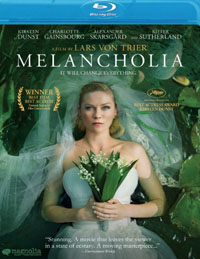 MELANCHOLIA
MELANCHOLIA
(R)
MOVIE: **1/2 (out of 5)
BLU-RAY EXPERIENCE: **1/2 (out of 5)
BY KEVIN CARR
I’ve never been a fan of the overly artistic piece. I understand that not all cinema is straightforward, and the more beloved films require a degree of introspection and dissection to be fully appreciated. Personally, I’m not into doing that. Call me a low-brow elitist for that attitude, but it’s just not my cup of tea. Even my favorite award films with deeper meaning wouldn’t be classified as art-house fare.
Like “The Tree of Life,” Lars von Trier’s “Melancholia” is one of those movies that was adored by many critics. And while I appreciated what it was trying to do, I wasn’t wild about it. In a strange way, I find myself talking more about other movies than directly about “Melancholia” when discussing the film.
The biggest comparison I make is to the aforementioned “The Tree of Life.” Both are mosaic pieces, though “Melancholia” is far more of a traditional narrative feature. But both films are to be respected and lauded for their fantastic cinematography. The plus side of “Melancholia” is that it is more coherent, and the special effects are more relevant to the film itself.
The story is about a woman named Justine (Kirsten Dunst), who torpedoes her marriage on her wedding night and falls into a deep depression. Mirroring her symptoms, the Earth itself is threatened by a rogue planet that has wandered into our solar system, causing mild but significant and strange changes to our world. Justine’s sister Claire (Charlotte Gainsbourg) is trying to be supportive of her melancholia, but as the end nears, she loses patience and touch.
The other film I often compare “Melancholia” to is the pretentious and dreadful “Another Earth.” Like my comparisons to “The Tree of Life,” I felt von Trier handled the planet angle much more realistically and interestingly. Instead of being a simple MacGuffin for the film, the rogue planet in “Melancholia” actually drives the story.
“Melancholia” is beautifully shot and can be appreciated on many visual levels, from the respectful adoration for picturesque cinematography to the rustic glee of seeing Kirsten Dunst topless. The movie is open to interpretation, but it also plays out as a story.
Unfortunately, von Trier can’t resist offering up an overture to the film, which includes gorgeous shots that lay out the entire plot before the film even starts. Sure, this shows von Trier’s perspective that the movie is not about surprise endings and has a bit to say about predestination. But I’d prefer a less spoilery beginning nonetheless.
The Blu-ray of Melancholia includes a featurette with the director, crew and cast talking about the film and its meaning. “The Universe” looks at the astronomical issues behind the film. “The Visual Style” looks at how von Trier achieved the movie’s look. “Visual Effects” deconstructs the not-overpowering but essential visual effects in the film. Finally, there’s the theatrical trailer as well as a behind-the-scenes featurette produced for HDNet.
